
|
![]()
Greatest Films of the 1930s
1930 | 1931 | 1932 | 1933 | 1934 | 1935 | 1936 | 1937 | 1938 | 1939
Title Screen Film Genre(s), Title, Year, (Country), Length, Director, Description 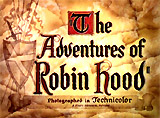


The Adventures of Robin Hood (1938), 106 minutes, D: Michael Curtiz, William Keighley
Director Michael Curtiz' swashbuckler/adventure film was one of Hollywood's best - featuring star Errol Flynn in one of his most famous roles (following Captain Blood (1935)). There were many remakes of the 'Robin Hood' saga - almost too numerous to mention - but mostly inferior. The most notable earlier example was the silent Robin Hood (1922) with Douglas Fairbanks, Sr. This was the most expensive Warner Bros. film to date at $2 million, but it turned out to be the studio's biggest money-maker in 1939. It was the second of eight films to pair Errol Flynn and Olivia de Havilland. It was filmed in beautiful Technicolor on a set with colorful pageantry and costumes, dashing sword fighting, music by Oscar-winning Erich Wolfgang Korngold, lively characters, sparkling dialogue, and exciting action contained to mostly two sets - Sherwood Forest and Nottingham (the castle and town). The title character was the legendary and infamous hero of Sherwood Forest, Robin Hood (Errol Flynn) (originally Saxon Sir Robin of Locksley). At the time, it was announced that King Richard the Lion-Hearted (Ian Hunter) had been imprisoned in Austria during his return from the Crusades in the Holy Land in the late 12th century. His treacherous Norman brother - evil Prince John (Claude Rains) and his ruthless henchman Sir Guy of Gisbourne (Basil Rathbone), plus support from the High Sheriff of Nottingham (Melville Cooper), attempted to take over England and brutally oppress the Saxon masses during King Richard's absence by heavily taxing them (and obtaining King Richard's ransom for themselves). Early in the film, the impudent Robin confronted Prince John and the Normans during a banquet at the castle and denounced him for treason in usurping the throne, but then fled and escaped when he was declared an outlaw and faced with execution if apprehended. Robin assumed the role of a rebellious outlaw leader of a guerrilla band (known as "Merrymen"), to confront Prince John and the Norman lords oppressing the Saxon commoners - to take from the rich while aiding the poor. Robin's recruited band of men to oppose the tyranny included Will Scarlett (Patric Knowles), Little John (Alan Hale) (when they met on a footbridge and engaged in a quarterstaff competition), and a fat Friar Tuck (Eugene Pallette). During Robin's ambush of Gisbourne's small army caravan with tax money, Lady Marian Fitzswalter (Olivia de Havilland), aka Maid Marian (who rode on Roy Rogers' future horse Trigger) was greeted when Robin appeared in the trees, swung down on a vine, and said to her: "Welcome to Sherwood, my lady!" She became enamoured of the dashing, heroic outlaw, and the two engaged in a secret and daring romance together. Other great sequences included an archery contest in Nottingham, Robin's rescue from a public hanging, and Robin and Marian's night-time window rendezvous when they confessed their love to each other. The film's swashbuckling climax was a lethal, exciting and vigorous sword-fighting duel between Robin and Sir Guy inside Nottingham Castle on a winding stone staircase, the return of King Richard and his men (disguised as monks wearing hooded cowls) and his reinstatement on the throne, while Prince John and the other traitors were banished for life. The conclusion brought the King's order and consent for Robin, now a Baron, to wed Lady Marian, to which Robin happily agreed: ("May I obey all your commands with equal pleasure, Sire!").


Alexander's Ragtime Band (1938), 105 minutes, D: Henry King
Director Henry King's nostalgic and lavish 20th Century Fox musical drama (the Academy Award winner for Best Musical Score) - was an enjoyable backstage show-biz musical and romance set in the days of vaudeville on Broadway (from 1915-1938). This film included 28 Irving Berlin songs, such as "Remember," "Blue Skies," "Easter Parade," "When That Midnight Choo-Choo Leaves for Alabam'," "Everybody's Doin' It," "A Pretty Girl Is Like a Melody," "My Walking Stick," "Heat Wave," and "Now It Can Be Told" (nominated for Best Song). The fictionalized film followed the career of Alexander/Roger Grant (Tyrone Power), a classical violinist who preferred playing popular ragtime music. In the mid 1910s, he disowned his high-society San Francisco Nob Hill family's wishes, formed a small combo band, and during one audition at "Dirty Eddie's" - a Barbary Coast saloon, he paired up with his songwriter-composer and pianist Charlie Dwyer (Don Ameche), and young contralto singer Stella Kirby (Alice Fay, Fox's studio queen) who sang "Alexander's Ragtime Band." The patrons and owner reacted positively and Roger's band and Stella were hired - she also dubbed Roger "Alexander" - and the band was named after the song. There were ups and downs in the relationship between the quarreling Roger and Stella, as he intermittently fought for her love over a period of about 25 years, while also contending for Stella's attention with his romantic rival Charlie. A love triangle developed between the three as they became more popular and opened at the Cliff House. Singer Davey Lane (Jack Haley) joined the group. By the end of WWI, Stella had moved on and become a great star on Broadway, and Roger became depressed over her marriage to Charlie. When ragtime began to weaken in popularity, Roger created a new band and added powerful vocalist Jerry Allen (Ethel Merman) as his new discovery, taking the band first to Greenwich Village, and then to new heights and performances in Paris, and ultimately a gala swing concert at Carnegie Hall. There, in the film's curtain closing ending, Roger and Stella (who had earlier divorced from Charlie) were romantically reunited onstage and sang "Alexander's Ragtime Band" together.

Algiers (1938), 95 minutes, D: John Cromwell
This romantic drama, a story of intrigue and romance, was a shot-for-shot remake of the original film Pépé le Moko (1937, Fr.) with Jean Gabin, an inspiration for Casablanca (1942), and also motivated the making of Universal-International's musical remake Casbah (1948). [Note: Chuck Jones' and Warners' animated cartoon character "Pepe le Pew" was based on the "Pepe le Moko" character. "Come, let me take you to the Casbah," however, was never spoken in this film. In the cartoon The Cats Bah (1954), Pepe le Pew stated the line: "Come with me to the Casbah," reinforcing the idea that the line was spoken by Boyer in the film.] Crafty international jewel thief Pepe Le Moko (Oscar-nominated Charles Boyer, in his most famous role) fled to the notorious, mazelike Casbah district in French Algiers (a safe hiding zone or native quarter in the modern city of Algiers with dark twisting alleyways). His goal in self-imposed exile was to escape from pursuing North African police, led by Inspector Slimane (Joseph Calleia), who knew he couldn't be apprehended there: ("To arrest him in the Casbah, distinguished colleague, would be simple. To get him out, would be impossible"). Pepe described his plight: "I'm caught here, like a bear in a hole. Dogs barking, hunters all around, no way out of it." Parisian Commissioner Janvier (Paul Harvey) had been pursuing Pepe for two years after he escaped from France, but knew Pepe couldn't be arrested if he remained in the Casbah. Pepe was living in the household of Grandpere (Alan Hale), while his men kept surveillance for him, including dimwitted Carlos (Stanley Fields), young Pierrot (Johnny Downs), dapper Max (Charles D. Brown), and Gil (Ben Hall). To help police due to his jealousy of Pepe, Fat Regis (Gene Lockhart) slipped a note to the police to inform them of Pepe's whereabouts. Then, he hinted a warning to Pepe's Algiers' mistress Ines (Sigrid Gurie) about an impending arrest. In the attack on Grandpere's house, Pepe was wounded but escaped. During the chaos in the Casbah, beautiful, bejewelled, sultry Parisian tourist Gabrielle "Gaby" (Hedy Lamarr in her American film debut), who was vacationing with her wealthy businessman fiancée Giraux (Robert Grieg), was caught in the gunfire. Gaby happened to meet Pepe who immediately fell into a doomed romance with the femme fatale. There were a few romantic love scenes between fugitive jewel thief Pepe le Moko and the beautifully seductive adventuress Gaby in the Casbah, with a few embraces, a dance, a kiss, and lots of give-and-take dialogue of intriguing affection about Pepe's love of Paris - a symbol of his longing for freedom: (Pepe: "You're all silk and you jingle when you walk and with all that chichi you make me think of the subway. Isn't that funny?"). He also took a fetishistic interest in her glittering jewelry. In the film's conclusion, Gaby was used to tempt Pepe out of the Casbah. He foolishly left town to see Gaby on her steamship about to sail to France, and was arrested before being able to speak to her, after seeing her through one of the ship's salon windows. As he was being taken away, the handcuffed Pepe asked to wait until the ship sailed away, but then spotted Gaby on the deck. He vainly called out to her, broke away from the authorities, and began running toward her on the dock, where he was fatally shot in the back by one of Slimane's men - a detective (Gino Corrado). As Pepe died in Slimane's arms, Slimane apologized for the shooting, because it looked like he was going to escape. Pepe replied: "And so I have, my friend."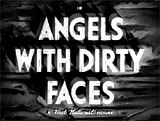


Angels With Dirty Faces (1938), 97 minutes, D: Michael Curtiz
Director Michael Curtiz' and Warner Bros' superb, fast-paced crime melodrama, a financial box-office hit in 1938, starred three greats - Cagney, O'Brien, and Bogart. Later due to its success, there was a sequel: Angels Wash Their Faces (1939). Two slum kids from Brooklyn grew up together - William "Rocky" Sullivan (Frankie Burke as youth) and Jerry Connelly (William Tracey as youth). They followed very different paths in their later lives as a result of an event in 1920 when they were youths. The two were caught by police stealing fountain pens from a railroad freight car. Although Jerry escaped, Rocky was snagged and sentenced to attend reform school. As adults, one became courageous, inner-city Catholic parish priest Father Jerry Connelly (Pat O'Brien as adult) in their same neighborhood, while the other became big-time, hardened gangster/convict Rocky Sullivan (Oscar-nominated James Cagney as adult). Over fifteen years later, conflict arose between the two when the pugnacious ex-con Rocky (after serving three years in prison for armed robbery) returned to the neighborhood and was soon being idolized by a group of tough and troubled slum punks (the future 'Dead End Kids') who were being counseled and overseen by the priest. Rocky seemed to settle down during a romance with childhood friend Laury Ferguson (Ann Sheridan), a parish social worker who rented him a room in her boarding house, but was still engaged in a life of crime with gang boss Mac Keefer (George Bancroft) and Keefer's business partner - snarling, crooked, double-crossing gangster lawyer James Frazier (Humphrey Bogart). The daring exploits of Rocky caused the Dead End Kids to idolize him and worship him as a role-model hero, causing Father Jerry immense concern for their emulation of Rocky's criminalized way-of-life, and disregard for the church's wholesome programs. Father Jerry was forced to engage in a campaign against the corruptive criminal element (in general) and its damaging effect on the community, and in particular as a means to condemn his boyhood friend. As the film was concluding, Keefer and Frazier plotted to murder Father Jerry, but Rocky intervened and gunned down both of his local rivals before fleeing to an abandoned warehouse where he also shot and killed an police officer. As a result, Rocky was captured and sentenced to death in the electric chair. In his cell, Father Jerry asked Rocky for a favor - to act fearful and cowardly ("yellow") so he wouldn't be regarded by the slum neighborhood boys as a hero, role model, or martyr. Rocky was reluctant to humble himself and show fear in the death chamber as a cringing coward pretending to be 'yellow.' However, In the film's concluding, unforgettable movie moment - an uncharacteristically-fearful Rocky was led to his execution, turning into a screaming, snivelling, cowering coward begging not to be killed (seen in silhouette). The next day's news headlines: "ROCKY DIES YELLOW: KILLER COWARD AT END!", were read by the neighborhood kids who couldn't believe Rocky's cowardice, but accepted it. They asked Father Jerry: "Did Rocky die as they said, like a yellow rat?" and Jerry responded with the film's final words: "It's true, boys. Every word of it. He died like they said. All right, fellas. Let's go and say a prayer for a boy who couldn't run as fast as I could."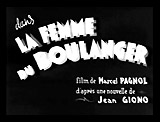


The Baker's Wife (1938, Fr.) (aka La Femme du Boulanger), 133 minutes, D: Marcel Pagnol
This charming comedy/drama, adapted from Jean Giono's novel Jean Le Bleu, was set in the small Provencal town in the late 19th century. Popular new (and rotund) baker and bread-maker Aimable Castanier (Raimu) was married to the beautiful and much younger Aurélie Castanier (Ginette Leclerc). When the unfaithful Aurélie soon ran off with a handsome shepherd named Dominique (Charles Moulin) for a romantic rendezvous, the distraught Aimable stopped baking, became suicidal, and started drinking heavily. The town's three leaders: the Marquis Castan de Venelles (Fernand Charpin), the Schoolteacher or L'Instituteur (Robert Bassac), and the Curate or Le Curé (Robert Vattier), planned to find Aurélie and return her to Aimable, so that they could reconcile their marriage and he could begin baking again.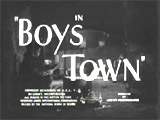

Boys Town (1938), 96 minutes, D: Norman Taurog
Director Norman Taurog's and MGM's esteemed, heart-warming biographical drama presented a portrayal of real-life, pious and dedicated Catholic Father Edward Flanagan (Best Actor-winning Spencer Tracy with his second consecutive win, after receiving an Oscar for Captains Courageous (1937)). It also featured a formulaic and simplistic approach to the rehabilitation of teenaged criminals. In the film's opening sequence, bitter and condemned convict Dan Farrow (Leslie Fenton), shortly on his way to the electric chair, asked Father Edward J. Flanagan in his cell: "How much time do I got?" and he heard the reply: "Eternity begins in 45 minutes, Dan." Farrow confessed his horrible and wayward upbringing, including how he had become corrupted within a state institution or reformatory. While riding on a train back to Omaha, Flanagan recalled the haunting (and echoing) words of Dan Farrow: "12 years old. One friend. Starving kid. Never had a chance. Reformatory." As a result, he became committed to developing a model community project known as Boys Town near Omaha, Nebraska. It would bring wayward orphans and juvenile delinquents from reform schools or gangs to an environment for a second chance where they could be truly educated in school and reformed. Father Flanagan pitched his idea for a home for boys, first to skeptical Jewish pawnbroker and friend Dave Morris (Henry Hull), who offered him some financial assistance of $100 for a rented house and furniture; Flanagan's main message and philosophy to prospective donors was: "There's no such thing as a bad boy," although some doubted him and refused his naive expectations. Skeptical, begrudging newspaper magnate John Hargraves (Jonathan Hale) also spoke with Flanagan when he was requesting funding and support for expansion: ("I want your help for homeless boys. I want you to let the world know what I'm trying to do"); Hargrave expressed opposition and some doubt about his ability to run a facility full of delinquents: "No, I'm afraid I can't do that....Because I don't believe in what you're trying to do. The very foundation is false. 'No such thing as a bad boy.' That's just a catch phrase, sentimental nonsense. Of course you know you're flying in the face of the very best of public opinion...A whole lot of good people feel just as I do and we're not un-Christian monsters." Flanagan persuasively continued: "I want a home for them where they can stay and where they can learn. A town for boys governed by boys. It's worth a shot, isn't it?" - Hargraves reluctantly agreed to support Flanagan's sincere and "unselfish" plan - to build a boys home for troubled teens in Omaha, Nebraska, known ultimately as Boys Town. A montage illustrated the building of Boys Town - including the collection of funds, architectural blueprints, staking of the property, the digging of the foundation and the use of heavy machinery, carpentry, concrete mixing and brick-laying, all culminating in a view of the finished product - FATHER FLANAGAN'S BOYS HOME. A ceremony marked the completion of three buildings (using the boys' labor), a US flag was raised, a band played, and boys cheered and devoured a food table. Flanagan's business partner, benefactor and financier Dave Morris reminded that there were three mortgages on the property that threatened its survival; he worried about the mounting debt: ("Look at the sweating you've done to raise nickels, dimes, quarters, penny contributions. Now you've got to get dollars, hundreds, thousands!"). Father Flanagan was initially challenged when he came up against one of the new arrivals - rebellious, cocky, tough-talking wise-guy punk teen and poolhall shark Whitey Marsh (Mickey Rooney), the volatile kid brother of convicted and imprisoned gangster-murderer Joe Marsh (Edward Norris), who had requested that Flanagan care for him, for $280. Whitey was a loveable but difficult and disruptive bad boy delinquent. He was found playing cards and smoking with his gang of friends. After dismissing the others, Flanagan removed Whitey's feet from the top of the table, knocked the cigarette out of his mouth, pulled him up by the collar and introduced himself: "I'm Father Flanagan. I saw your brother Joe just a little while ago. We had a long talk about you, Whitey. Joe wants you to come with me to Boys Town" - when Whitey refused and mouthed off, Flanagan struck back: "Now, look, Whitey, in a pinch I can be tougher than you are, and I guess maybe this is the pinch. You're coming with me to Boys Town because that's the way your brother wants it. And that's the way I want it" - he then reprimanded Whitey who was faking an arm injury: "Now, why don't you stop acting like a kid, Whitey?" Whitey remained at Boys Town but then suffered a number of setbacks to his ego - he lost an election for the high position of the community's Mayor (with his campaign slogan: "Don't be a sucker!") to handicapped Tony Ponessa (Gene Reynolds), and was defeated in a boxing match against Freddie Fuller (Frankie Thomas). Spitefully, Whitey left Boys Town, and was involved in a car accident that injured his pal Pee Wee (Bobs Watson) who had followed after him. Whitey also came into contact with his older brother who had escaped custody and was robbing a bank in Omaha (and Whitey was accidentally shot in the leg). Whitey promised to not squeal and refused to give up vital information that might incriminate his brother - something that threatened to close Boys Town forever: (Flanagan: "You're shielding someone. Are you going to see these boys turned out into the streets, into the alleys, into reformatories, and worse, lose their home?"). Whitey was ultimately reformed and redeemed by Flanagan's patient efforts, when he helped in the recapture of his brother and was returned to Boys Town, where he was acclaimed as the new Mayor.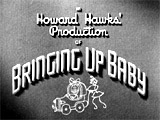



Bringing Up Baby (1938), 102 minutes, D: Howard Hawks
Director Howard Hawks' classic film was one of the greatest of Hollywood's and RKO Studios' fast-paced screwball comedies, noted for the director's ability to helm any film genre. This was the second of four films pairing Cary Grant with Katharine Hepburn, and reportedly the first film with the word "gay" in the dialogue. Unbelievably, the film bombed at the box-office and as a result of the commercial failure, Hawks lost his RKO production contract, and Hepburn bought out her film contract (and continued to be labeled "box-office poison"). Many years later, it was loosely remade as What's Up, Doc (1972) starring Barbra Streisand and Ryan O'Neal. In the fast-paced, inventive, and sometimes lunatic comedy, in the opening scene, absent-minded, mild-mannered, shy bespectacled paleontologist Professor David Huxley (Cary Grant) was high up on a scaffolding working in the Stuyvesant Museum of Natural History to assemble a Brontosaurus skeleton (but he was missing only a single bone about to finally be delivered - an "intercostal clavicle"). He was worried about an impending $1 million dollar museum donation from wealthy, gift-giving philanthropist-sponsor Mrs. Elizabeth Carlton Random (May Robson), aka Aunt Elizabeth. He was also preoccupied by his stiff and bossy co-worker and bride-to-be Miss Alice Swallow (Virginia Walker) who he would marry the following day. That afternoon, David was playing golf with Mr. Alexander Peabody (George Irving), a lawyer who represented Mrs. Random and would supervise her proposed donation to complete the construction of the hall. On the course, he encountered the scatter-brained, mad-cap, fast-talking, flighty, eccentric heiress Susan Vance (Katharine Hepburn), Mrs. Random's niece, who continuously interrupted his golf game with Mr. Peabody, and wrongly claimed his golf ball was hers. She also drove away in his battered car as he pursued her and called out to his golf partner: ("I'll be with you in a minute, Mr. Peabody!"). The Professor kept running afoul with her during absurdist encounters - at a fashionable supper nightclub in the Ritz Plaza Hotel, for example, he slipped and took a pratfall on an olive that she had dropped on the floor during an "olive game." Afterwards, he used his torn tuxedo to cover up her torn evening gown as they exited, and then confessed outside to her that he was fixated on her: "I'm strangely drawn toward you..." before sprawling face-first onto the ground. Comic, chaotic situations continued to arise when she set her sights on him and sent his life into turmoil because of her accident-prone nature. When she offered to drive him to her Aunt Elizabeth's farm in Westlake, CT on the day of his marriage, he wasn't aware that she had a music-loving, 3 year-old tame pet leopard named Baby that she planned to bring along in the car. He was also forced to bring along a package containing an important "intercostal clavicle bone" for a brontosaurus reconstruction that he was working on. When they arrived at the farm, he had no choice but to wear a frilly, fur-trimmed negligee, due to Susan's meddling. And when greeted by Susan's Aunt, he had to blurt out: "I just went gay all of a sudden." Further upset arose when David's dinosaur bone was stolen by Susan's aunt's dog George (Asta of The Thin Man series) and buried somewhere on the grounds. To chase after an escaped Baby into the woods, Susan carried a butterfly net while David was prepared with a rope and croquet mallet. They found Baby sitting on a neighbor's roof, and to calm the tame leopard and attract him down off the roof, they serenaded Baby with his favorite and fondest song, "I Can't Give You Anything But Love, Baby." (Complications arose when a real, murderous escaped leopard from the circus was also on the loose.) After causing a disturbance, the two were reported by the home owner Dr. Fritz Lehman (Fritz Feld) and thrown in the local jail by Constable Slocum (Walter Catlett). They occupied adjacent jail cells in the Westlake City Jail where Susan fancifully pretended to be a gangster moll (a member of the 'Leopard Gang,' infamous for robberies and other criminal activities). After everything was cleared up, and Alice broke up with David, Susan came (to return the missing dog-buried bone) to visit David at the museum where he was high up on a platform working on the brontosaurus skeleton. The zany film concluded with her toppling the entire platform and skeleton to the ground - as David grabbed onto Susan's dangling hand to rescue her.


The Citadel (1938, UK), 110 minutes, D: King Vidor
Director King Vidor's drama was a film adaptation of A. J. Cronin's 1937 best-selling novel. A poor, but idealistic, dedicated Scottish doctor Andrew Manson (Robert Donat) treated Welsh mining town miners who were infected with work-related TB, caused by silica dust in the anthracite mines. He dismissed his ideals and noble goals, however, when he began a more lucrative practice by treating aristocratic, rich London hypochondriacal patients instead, and cast aside his faithful, equally-idealistic schoolteacher wife Christine (Rosalind Russell) and his best friend Denny (Ralph Richardson). When his friend died (due to medical incompetence from high-priced surgeon Charles Every (Cecil Parker) after a car accident) and his wife convinced him to restore his true goals in life (and restore faith in himself), he reformed himself. Following an impassioned plea to the General Medical Council to save his career, he returned to minister to the people of the poor village.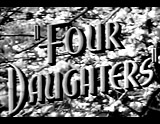


Four Daughters (1938), 90 minutes, D: Michael Curtiz
Director Michael Curtiz' tearjerker and soap-opera-ish romantic drama was derived from a story by Fannie Hurst, with three real-life Lane sisters playing three of the four daughter roles. A music professor and widower Adam Lemp (Claude Rains), the Dean of the Briarwood Music Foundation, raised his four daughters: Thea (Lola Lane), Kay (Rosemary Lane), Emma (Gale Page), and the youngest Ann (Priscilla Lane) in a small town with the help of his sister - their elderly, no-nonsense Aunt Etta (May Robson). Romance-minded Emma was courted by boy-next-door neighbor florist Ernest Talbot (Dick Foran), while Thea wished to marry wealthy banker Ben Crowley (Frank McHugh), and Kay was busy with her singing career. The youngest, fun-loving Ann, vowed not to marry. Then, all four daughters became enamoured with boarder and pupil Felix Deitz (Jeffrey Lynn), a popular music conductor and composer, who chose to be engaged to Ann. On the eve of their wedding, realizing that Emma was really in love with Felix, Ann sacrificed her love and ran off with surly, tough, cynical, reckless and bitter musician Mickey Borden (John Garfield in his film debut). When poverty made their relationship difficult and he committed suicide, Ann returned home to be reunited with Felix.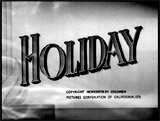


Holiday (1938), 93 minutes, D: George Cukor
Director George Cukor's romantic comedy wonderfully paired Cary Grant and Katharine Hepburn, the third of four instances in which they appeared together. (The stars also appeared together in Sylvia Scarlett (1935), Bringing Up Baby (1938), and The Philadelphia Story (1940).) Considered a New Years' Eve classic, it was adapted from the 1928 Broadway play written by Phillip Barry. Both this remake film and its earlier iteration Holiday (1930) (starring Ann Harding and Mary Astor) were financial flops. Its main theme was about two impending marriages - one that was entirely wrong, and one that was more appropriate. A non-conformist, independent-thinking, poor, free-spirited young man Jonathan "Johnny" Case (Cary Grant) was pressured to please his rich and pretty socialite fiancee Julia Seton (Doris Nolan) and her stuffy privileged family and join her blueblood, conservative widowed father Edward Sr.'s (Henry Kolker) banking firm. A lavish engagement party for them was planned for New Years' Eve in the Seton's extravagant and gigantic Park Avenue mansion. Thirty year-old Johnny refused to conform to the family's rigid demands and take Edward's offer of a bank job by announcing that he was going on a long-term 'early retirement' holiday, but then reluctantly accepted a temporary, two-year position at the bank (with the condition that he would remain if he was happy) after marriage. However, he began to realize deep-down that Julia's more free-thinking, vivacious, unconventional, eccentric older sister Linda (Katharine Hepburn) was the only one who understood and loved him for his independent ways - and was a much better soul-mate and marital match. Linda's and Julia's alcoholic and depressed younger brother Ned, Jr. (Lew Ayres) was proof that slavish obedience to the family's stifling and wealthy lifestyle had been damaging to his health and well-being. In the film's conclusion, the marriage (and honeymoon trip) was called off between Johnny and Julia, and Johnny reestablished his plans to embark on a holiday voyage to Europe with his friends, Professor Nick Potter (Edward Everett Horton) and his wife Susan (Jean Dixon) - but this time, he would be taking Linda in Julia's place.

Jezebel (1938), 104 minutes, D: William Wyler
In William Wyler's drama, Bette Davis gave a magnificent performance - often compared to Gone With The Wind (1939). The role was offered to her as consolation by Warner Bros. because she was denied the role of Scarlett O'Hara. Davis won her second Best Actress Award for her performance. In the plot, headstrong, spoiled, self-centered Southern belle daughter Julie Morrison (Bette Davis) of a Southern aristocratic family in pre-Civil War New Orleans lost her fiancee Preston Dillard (Henry Fonda) when she stubbornly defied the convention of the day by wearing a scandalous red dress to the Olympus Ball. Embarrassed, he left and unbeknownst to her married Northerner Amy (Margaret Lindsay). When Preston returned three years later, she begged forgiveness but it was too late, and she suffered hurt and rejection, and felt she faced life alone. When an epidemic of yellow jack struck, she begged Amy to accompany the mortally ill Preston to an island for quarantine and care for him ("Help me make myself clean again as you are clean") - it was the ultimate sacrifice. The final view was of a resolute Julie riding off in a quarantined wagon-load of yellow fever victims (including Pres) to the hellish, condemned Lazarette Island.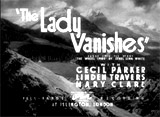




The Lady Vanishes (1938, UK), 97 minutes, D: Alfred Hitchcock
This was a highlight among Hitchcock's British films - a cleverly-contrived and intriguing mystery story. It was remade as The Lady Vanishes (1979) - a British comedy-mystery with Elliott Gould and Cybill Shepherd. Set just before WW II, young socialite Iris Henderson (Margaret Lockwood) was traveling on an express train from Mandrika and moving through Europe to return to England (for her impending marriage). A charming elderly lady, English governess Miss Froy (Dame May Whitty), suddenly disappeared and it was discovered that no one was willing to believe or accept that the lady had disappeared or that she even existed. With the help of fellow passenger-musicologist Gilbert Redman (Michael Redgrave in his film debut), Iris sought to locate Miss Froy. The suspense increased when Iris and Gilbert were pulled into the beguiling and strange incident - with the only proof being Miss Froy's name written in fog/frost on the train window. Iris' memory and veracity were questioned, since she was hit over the head with a flowerpot while boarding the train, suffered a concussion, and might be delusional. During the quest for Miss Froy (who was eventually discovered alive and safe), there were thoughts of a sinister, mysterious conspiracy to kidnap her. Her disappearance was linked to an espionage plot, and she was ultimately identified as a British agent-spy who had memorized a musical tune (with a secret encoded message) desired by the enemy - Hitchcock's trademark "MacGuffin." Miss Froy had first heard the tune being sung by a Tyrolean street folk singer outside of her hotel just before he was strangled, and she was to deliver the message to the Foreign Office in Whitehall.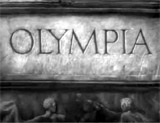


Olympia (1938, Germ.), 118 and 107 minutes (in two parts: Festival of the Nations, and Festival of Beauty, aka Olympia 1. Teil: Fest der Volker, and Olympia 2. Teil: Fest der Schonheit), D: Leni Riefenstahl
Innovative German film-maker Leni Riefenstahl documented the 1936 Berlin Olympics (famous for American track star Jesse Owens who won four gold medals for his sprint racing) in this stunning film - with graceful and beautiful images of 'Aryan' athletes in competition. The film's innovations directly influenced future televised sports coverage. It opened with a beautiful, silent prologue sequence with views of ancient nude Greek statues (that seemingly came to life), nude dancers, and near-nude male athletes. The images artistically captured the movement of beautiful human bodies to perfection.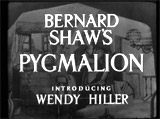



Pygmalion (1938, UK), 96 minutes, D: Anthony Asquith, Leslie Howard
This delightful romantic comedy was the first (non-musical) film version of George Bernard Shaw's 1912 screenplay and 1913 stage play, which had its British opening in 1914. The Broadway musical remake that was inspired from this film, Lerner and Loewe's 1956 production, also led to the famous film musical My Fair Lady (1962), that would walk away with eight Oscars (out of twelve), including Best Picture. The 1938 British film was honored with four Academy Award nominations including Best Picture, Best Actor (Howard), and Best Actress (Hiller), and one Oscar for Best Screenplay. It was a socio-economic drama based on the Cinderella story, but actually taken from the Greek myth of Pygmalion - about a sculptor who fell in love with a marble statue of his own making. A bullying, stuffy and smug bachelor, Professor Henry Higgins (Leslie Howard) - a teacher of phonetics and linguistics, made a bet with his friend, language scholar Colonel George Pickering (Scott Sunderland) that he could educate and transform a common, coarse and impetuous Cockney 'guttersnipe' flower seller from London's Convent Garden, Eliza Doolittle (Wendy Hiller in her first screen role) into being able to speak "genteel" (in proper English) and pass as a captivating British lady/duchess of upper class breeding - within six months - at the Ambassador's Ball. To do so, he had to transform her thick-accented voice, by coaching her to speak proper English with elocution lessons, teaching her manners, and drilling her so that she would appear educated. "We were above that in Convent Garden...I sold flowers. I didn't sell myself. Now you've made a lady of me; I'm not fit to sell anything else." "I'm a good girl, I am." She went through the rigorous training reluctantly, especially after being scrubbed in the bathtub, forced to dress in clean clothes, and incessantly drilled in both etiquette and speaking. At a tea party, in her first public testing, she blurted out, "Not bloody likely" and scandalized the attendees. However, she made a spectacular debut at the Ambassador's reception, proving him right when she was mistaken as a princess, rather than as a guttersnipe. In the process of teaching her, Higgins fell in love with her, although she was also attracted by upper class gentleman Freddy Eynsford-Hill (David Tree). After the bet was resolved between Pickering and Higgins, Eliza was treated with disregard and cold indifference by Higgins, and found that she couldn't just return to her old way of life. She abandoned him (after throwing his slippers at him in frustration) and left to be taken in by her eager suitor Freddy. In the happy conclusion, when Higgins was in his house playing a recording of Eliza's voice from months earlier, Eliza surprisingly returned to him (he had immensely missed her) for a hopeful reunion, although he was still imperious and demanded: "Where the devil are my slippers, Eliza?"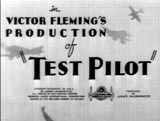

Test Pilot (1938), 118 minutes, D: Victor Fleming
Director Victor Fleming's exciting aviation drama featured stunningly-photographed aerial sequences, and was one of MGM's greatest hits of the year. It told the story of an adventurous, daredevil test pilot Jim Lane (Clark Gable) who tested planes manufactured by Howard Drake (Lionel Barrymore), aided by loyal mechanic Gunner Sloane (Spencer Tracy). When testing a plane and forced to land in a Kansas cornfield, Lane met and fell in love with farm girl Ann Barton (Myrna Loy) and they married. Lane was a brilliant test pilot but unpredictable and uneasy about settling down into domestic life as a husband and father. He obviously enjoyed the risks of his profession, which made it difficult for his wife to sit and watch him testing a new Air Force bomber.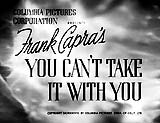

You Can't Take It With You (1938), 126 minutes, D: Frank Capra
Director Frank Capra's great and endearing Best Picture-winning screwball comedy was based on the Pulitzer Prize-winning play from Moss Hart and George S. Kaufman. Receptionist/secretary Alice Sycamore (Jean Arthur) was the beautiful and sane daughter of an eccentric and happy family, run by philosophical patriarch/grandfather Martin Vanderhof (Lionel Barrymore). Family members were involved in free-wheeling activities including painting and sculpture, ballet dancing, fireworks invention and experimentation, xylophone playing, mystery writing and more. Alice worked in the offices of capitalist Anthony P. Kirby (Edward Arnold), a rich conservative banker. She feared that she might never marry, due to her crazy family. However, she became engaged to Kirby's son Tony Kirby (James Stewart), a down-to-earth son. Problems erupted when the two incompatible families were to meet for dinner at the Sycamore's house before the wedding. The Kirbys mistakenly arrived one day early, fireworks were accidentally set off, everyone was carted off to jail, and the relationship between Tony and Alice was quickly put in serious jeopardy - would their love win out?